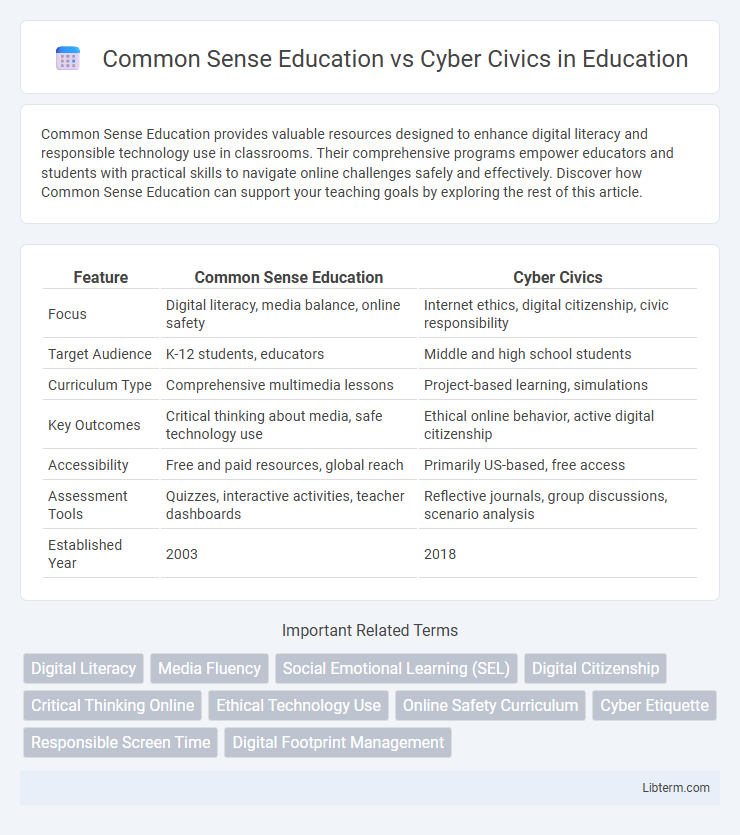Common Sense Education provides valuable resources designed to enhance digital literacy and responsible technology use in classrooms. Their comprehensive programs empower educators and students with practical skills to navigate online challenges safely and effectively. Discover how Common Sense Education can support your teaching goals by exploring the rest of this article.
Table of Comparison
| Feature | Common Sense Education | Cyber Civics |
|---|---|---|
| Focus | Digital literacy, media balance, online safety | Internet ethics, digital citizenship, civic responsibility |
| Target Audience | K-12 students, educators | Middle and high school students |
| Curriculum Type | Comprehensive multimedia lessons | Project-based learning, simulations |
| Key Outcomes | Critical thinking about media, safe technology use | Ethical online behavior, active digital citizenship |
| Accessibility | Free and paid resources, global reach | Primarily US-based, free access |
| Assessment Tools | Quizzes, interactive activities, teacher dashboards | Reflective journals, group discussions, scenario analysis |
| Established Year | 2003 | 2018 |
Understanding Common Sense Education
Understanding Common Sense Education involves exploring its comprehensive digital literacy curriculum designed to help students navigate technology responsibly, emphasizing privacy, digital footprint, and media literacy. This program offers age-appropriate lessons targeting K-12 students to foster critical thinking and ethical online behavior. Compared to Cyber Civics, Common Sense Education provides broader and more accessible resources for educators aiming to cultivate safe and informed digital citizens.
Defining Cyber Civics
Cyber Civics is an educational program developed by the iCivics organization that focuses on teaching students digital citizenship through a comprehensive curriculum integrating civics education with online behavior. Unlike Common Sense Education, which emphasizes digital literacy and safe technology use, Cyber Civics advances understanding of democratic principles, ethical online interactions, and the responsibilities of digital citizenship. By promoting critical thinking about digital rights and societal participation, Cyber Civics fosters responsible and informed engagement in the digital world.
Core Philosophies: A Comparative Overview
Common Sense Education emphasizes digital citizenship through practical skills, aiming to empower students with media literacy, privacy awareness, and responsible online behavior. Cyber Civics centers on teaching ethical decision-making and civic responsibility in digital spaces, fostering a community-oriented mindset grounded in real-world social contracts. Both curricula prioritize preparing students for safe, respectful, and informed participation in the increasingly digital society.
Curriculum Structure and Delivery Methods
Common Sense Education offers a comprehensive curriculum structured around digital citizenship themes like privacy, bullying, and media literacy, delivered through interactive lessons, videos, and quizzes suitable for K-12 students. Cyber Civics emphasizes a research-based curriculum focusing on social-emotional learning and online safety, using discussion-driven classes and project-based activities tailored for middle school students. Both programs integrate real-world scenarios but differ in delivery, with Common Sense leveraging digital tools and Cyber Civics prioritizing classroom dialogue and collaborative problem-solving.
Target Age Groups and School Integration
Common Sense Education targets students from kindergarten through 12th grade, providing age-appropriate digital citizenship lessons tailored to each developmental stage, and is designed for integration across various subjects and grade levels. Cyber Civics focuses primarily on middle school students, offering a dedicated curriculum to be implemented once or twice a week as a standalone class on digital ethics and responsible citizenship. Both programs support school-wide integration but differ in their approach, with Common Sense Education emphasizing flexible incorporation into existing classes and Cyber Civics promoting a specialized course structure.
Key Competencies Taught
Common Sense Education emphasizes digital literacy, online safety, and critical thinking skills to help students navigate the digital world responsibly. Cyber Civics focuses on developing civic engagement, ethical decision-making, and digital citizenship competencies to prepare students for active participation in online communities. Both programs prioritize fostering responsible behavior and informed decision-making in digital environments.
Teaching Digital Citizenship
Common Sense Education emphasizes interactive lessons and multimedia resources to teach digital citizenship, focusing on online safety, privacy, and media literacy for K-12 students. Cyber Civics integrates social-emotional learning with digital citizenship by promoting respectful online interactions and critical thinking skills through project-based activities. Both programs aim to equip students with essential skills to navigate the digital world responsibly, but Common Sense offers a broader curriculum while Cyber Civics provides a more intimate classroom experience.
Parent and Community Involvement
Common Sense Education integrates parent and community involvement through comprehensive resources and workshops, empowering families to support digital citizenship at home and fostering collaboration between schools and local organizations. Cyber Civics emphasizes active engagement by providing parents with tools to reinforce classroom lessons on online ethics and safety, encouraging consistent conversations between students and caregivers about responsible internet use. Both programs prioritize building strong partnerships with parents and communities to enhance student understanding and practical application of digital citizenship principles.
Benefits and Limitations of Each Approach
Common Sense Education emphasizes digital literacy and online safety by providing structured lessons on responsible technology use, which benefits students through well-developed, age-appropriate content but may lack flexibility for rapidly changing digital landscapes. Cyber Civics focuses on fostering ethical online behavior and civic responsibility through project-based learning, enhancing critical thinking and social engagement; however, it may require more extensive teacher training and resources for effective implementation. Both approaches address essential aspects of digital citizenship but vary in scalability and adaptability to diverse educational settings.
Choosing the Right Program for Your School
Common Sense Education offers comprehensive digital citizenship curricula tailored for K-12 students, emphasizing media literacy, online safety, and responsible technology use with standards-aligned lesson plans and interactive activities. Cyber Civics focuses on foundational ethics and civic responsibility in online interactions, designed for middle and high school students with a research-based framework promoting respectful digital communities. Evaluating your school's grade levels, educational goals, and integration needs will help determine whether Common Sense Education's broad, adaptable resources or Cyber Civics' targeted ethical approach best supports your digital citizenship program.
Common Sense Education Infographic

 libterm.com
libterm.com